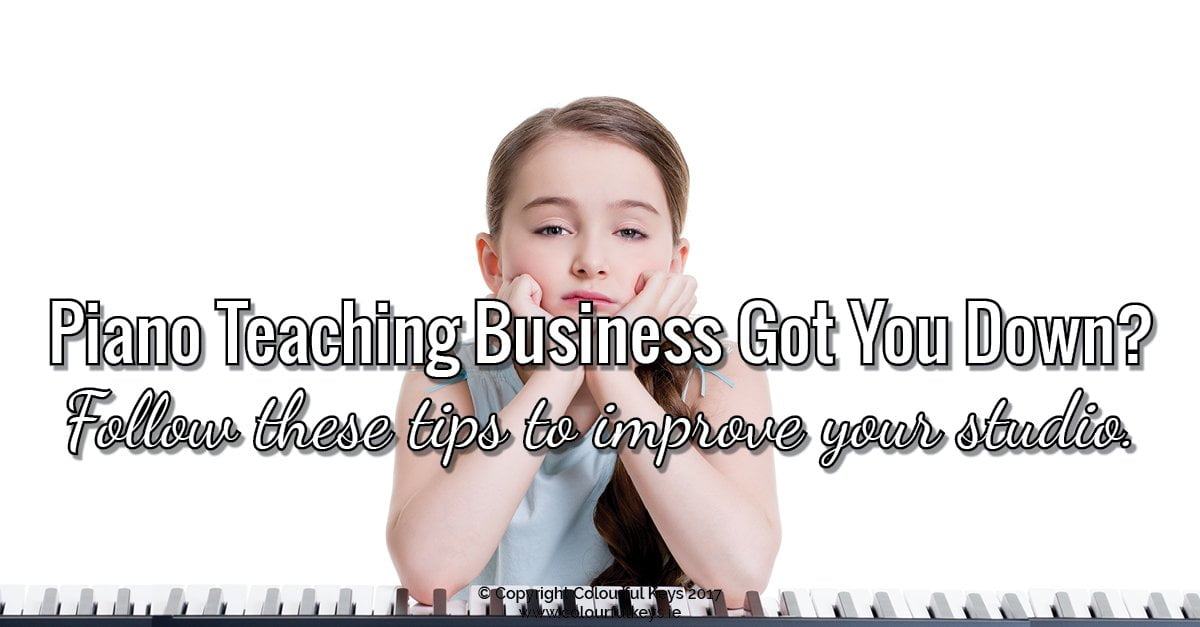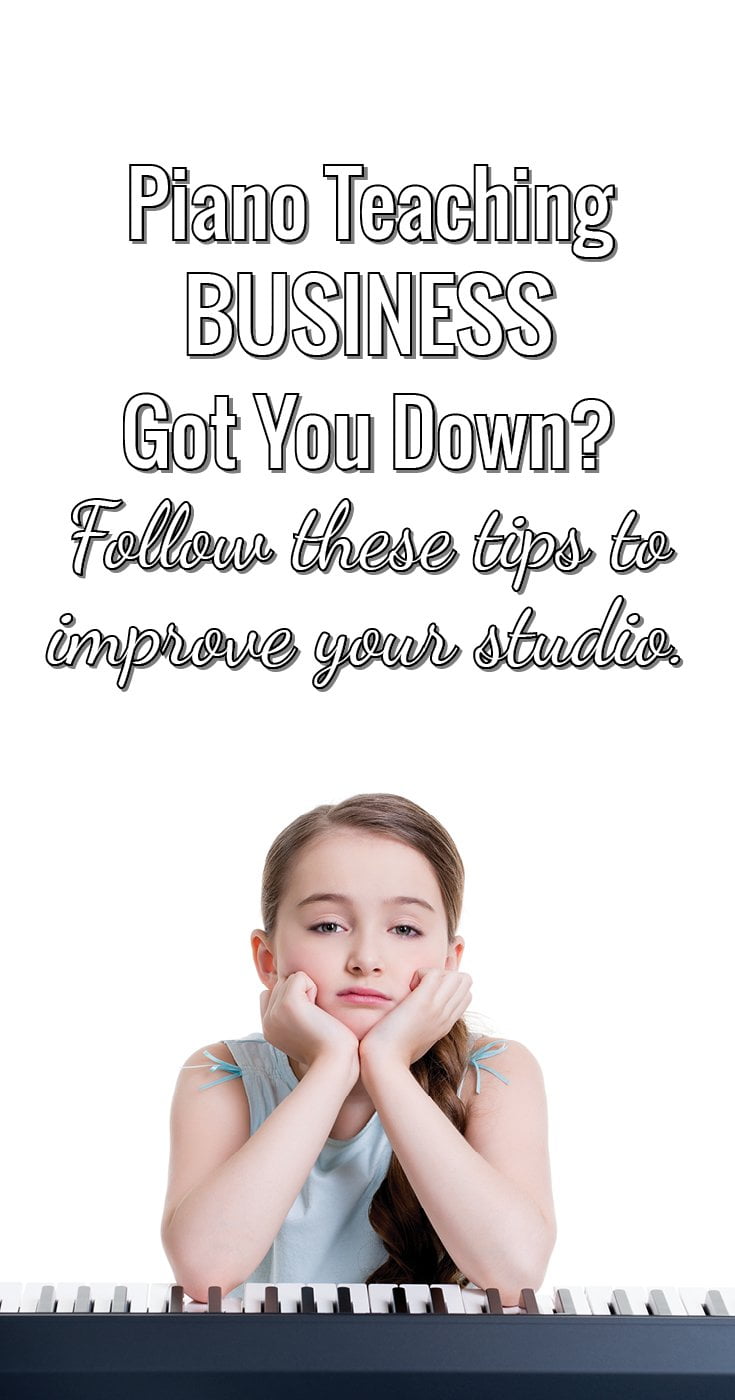You’re a piano teacher. You love teaching, working with kids and exploring music. There’s one part of this you might not love though…your piano studio business.
If policies, spreadsheets and marketing have you massaging your temples trying not to get a headache – then stop massaging my friend. Help is at hand.

In this article, I’m going to teach you how to get SMARTER with your piano studio business.
You may have heard of setting “smart” goals. Well, this is like that – but two better. Plus this acronym is all about business and how to be successful as a self-employed piano teacher.
So let’s jump in and make your piano studio business SMARTER and your life a little easier.
Specialise
You can’t be all things to all people. If you are – you won’t stand out to anyone.
If your piano studio advertising materials say something like…
“Piano lessons for all ages and levels with a friendly and fun approach.”
Then this advice is for you: pick a specialty to market to. Talk to one person, not everyone.
Imagine you’re walking down the street and you see two posters.
- One has a statement like the one above. It states the teacher’s experience and expertise and possibly the area she teaches.
- The second poster talks asks if you quit piano when you were young and always wanted to pick it up again. It talks about the benefits of piano lessons for adult students and the approach the teacher takes to teaching adults.
Now, if you’re a parent of a six year old, and you never learned piano when you were younger then sure, you’ll breeze on by the second poster.
But if you fit that demographic, then it’ll feel like the poster is talking to YOU. You’ll be so excited to finally get back to the piano that you’ll call right away and book that lesson.
Even the parent of the six year old isn’t going to be excited to call the first poster. They might call, if they happened to be looking for a teacher already. But if they were looking for a teacher, they probably would just search online for one anyway. And you haven’t exactly convinced them to consider piano lessons for their child.
If you’re worried about excluding customers – don’t be. You can have multiple types of students. The parents will not be bothered about the adult student posters if you’re also an excellent teacher for their kids.
You’re not excluding – you’re targeting.
Don’t be a confetti canon. Be a laser pointer.

Market
Ok, so you have your specialty (or specialties) picked out to target to. How exactly do you market to these people? What works when it comes to piano studio marketing?
There are many things you can try to market your studio. What works in a small town might not work in a big city. What works in Ireland might not work in New Zealand. Or Toronto. Or Lima.
A big part of marketing in the beginning is going to be trial and error. Try as many of these ideas that you can find the time and money to do and see what sticks!
Free Marketing Ideas
- Posters/flyers (always check what’s permitted in your area)
- Around your town
- Libraries and on community notice boards
- Daycares, schools and preschools
- Recreation centres
- Colleges & conservatories
- Events – make sure to have business cards or leaflets available at any public events such as performances, gigs and public student recitals
- Online listings – for example yellow pages, gumtree or local parent info directories. Check what’s popular where you live and get your details up there.
- Facebook page – even if you don’t have a website (and you should!) make sure you at least have a Facebook page. It’s completely free and it gives people a way to see your studio information online.
- Press – if you can find a good angle, you might be able to get a local paper, magazine or radio to do a feature on you. Find something interesting to submit and you never know!
Paid Marketing Ideas
- Website – getting a website can be done for free, but I think it’s worth paying for a low-cost self-hosted website rather than going with a completely free option. It doesn’t have to cost more than a few dollars a month though.
- Facebook advertising – be very careful when you set a budget on this. Make sure to set it at the lowest possible at first and monitor your spend carefully. Facebook ads can be very powerful, but there is a learning curve and they’ll be quite happy to take your money if you offer it.
- Google AdWords – this is less cost effective than it used to be, but still can be a useful tool. As with Facebook, watch your budget, spend carefully and do your research first.
- Merchandise – can increase your brand visibility around town
- T-shirts
- Pens/pencils
- Keyrings
- Mugs
- Magnets
- Local paper/magazine/radio advertising – not extremely effective in my opinion. Definitely worth trying IF it runs cheap where you live. In a big city I don’t think this is a good option for piano studio businesses.
Analyse
If you had a little shop selling stationary, you would definitely keep careful track of what sold and what didn’t. So, if you’re going to run your piano studio like a business (and you should) you need to track your data.

This does not have to be scary or overwhelming. I know not everyone likes spreadsheets as much as I do – but this doesn’t have to be painful. I promise.
The simplest way to do this is to:
- Keep track of all inquiries you get in one sheet.
- Make a note of how they contacted you and whether they signed up.
- Make sure to also ask them how they heard about you.
These few bits of information are important if you’re going to figure out which marketing efforts are sticking. You don’t want to waste time doing other things if they only way you ever get students is from your website. So track it.
While you’re at it, you should also track all your income and expenses. Not just for taxes – for you too.
Real businesses know where they make money and where they spend it. They evaluate how they’re doing so far and make plans for the future. Which leads us to…
Realistic & Regular Goals
Set yourself concrete goals for your studio, at least once a year. I prefer once a quarter as I find that easier to track and manage.
Your goals need to be specific, measurable and realistic.
If you tend to err on the side of big dreams, scale yourself back. If you tend to be pessimistic, push yourself to dream big.
Trust Your Gut
Did you ever take a phone call from a prospective piano parent and literally every sentence they said made you a little queazy?
I’m not talking one thing that gave you a furrowed brow. I’m talking about every next word made you feel worse and worse about taking on this client.
Yeah, THAT feeling. And did you let them join your studio anyway? And did you regret it?
Thought so.
In the first few years of your business, you won’t have these kind of instincts and gut feelings. You won’t know when to trust your gut and people might surprise you.
But as the years stack up a little, you’ll find that you develop a sense of who’s going to be a good client. Or which piano parent it’s OK to give some slack on payments, and which will take a mile if you give them an inch.
So trust your instincts when you have them. It’s your business, you get to run it your way.
Emphasise Value
TO THEM.
Not value to YOU.
Sorry for yelling there – but I see this time and again. Teachers are implementing the right policies or plans that are perfectly fair and reasonable. What they’re not doing is framing the message so that the customer sees that.
Always read through your communications – especially if it’s about something important like a rate raise or policy change – and ask yourself:
“Am I talking about how this benefits THEM?”
Because if you’re not, that’s when you’ll get a backlash. That’s when you get parents quitting, complaining or debating policies with you. We don’t want that to happen.

Let me give you an example so you can see this in action.
Say Susie currently teaches 30 minute lessons weekly. She wants to go up to 40 minute lessons across the board, and also switch out two weeks a semester for group lessons.
Susie could send an email explaining the new structure in this light:
I am feeling very rushed during the lessons and I need the extra 10 minutes with each student so that we can review practice instructions and theory concepts.
The group lesson weeks will mean I have extra time to prepare directly before the recitals and festivals – which I’m sure you can understand take a great deal of planning and energy in the lead up week.
Susie sounds pretty reasonable, right? I mean it’s all true. Recital week is crazy and she needs the extra time, and 30 minute lessons are stressful when we’re trying to cram everything in.
But the parents don’t care about that. They might sympathise, but it doesn’t affect their bottom line. You need to make it about THEM.
Moving to 40 minute lessons will allow students to make faster progress and review concepts more thoroughly during the lesson so that practice time is easier. It will also mean that some of you who have been stuck waiting in your cars will now have time to run an errand or go for a coffee instead!
Bringing more regular group lessons into the schedule has been something I’ve wanted to do for a long time. There are so many benefits of group lessons such as performance practice, learning through theory games, and getting to bond with otheryoung pianists going through the same process. Learning the piano is hard work and it really helps kids to know that others are in it with them.
These are just examples of reasons – your’s might be totally different. But they must always be framed from this perspective. How does this change make their life better or easier? What’s in it for THEM?
Reflect, Revisit and Reward
That advice would work if we were talking about the craft of teaching. But I am still thinking of you and your business here.
You need to make a point of regularly checking in with your piano studio business. How can you plan for the future if you haven’t looked back?
One of the big mistakes with goal setting is that people feel good for just having written out their list. But they might never actually…you know…do anything about it.
The true value comes from revisiting and reflecting on those goals. Schedule at least two times a year when you plan to do this reflection and revisiting. Before you set new goals.
- Did you achieve what you set out to?
- If not, what stood in your way? Were your goals unrealistic, or did something unexpected happen?
- If you did, how did you do it? What were the biggest contributors to your success?
Take the time to answer these questions honestly and your business will be better for it.
The reward part of this section is even more important. It’s perhaps the most important thing in this article in fact.

I want you to reward yourself when you do reach your goals, whatever they were. It’s so easy to move straight on to the next thing – our to-do lists seem endless and we’re impatient to get on and keep driving.
That’s a recipe for burnout if I ever saw one. If you don’t take the time to bask in the glory of achieving what you set out to, at some point you’re going to run out of fuel.
Here’s the thing about running a piano studio business: YOU are the business.
If you crash, so does your business. So take the time to reward yourself. Have a dinner with a friend, go to a theme park or just lie out in the sunshine for an afternoon.
You deserve it.
What smart steps have you taken for your business?
Do you fall into any of these traps regularly? Is there a key element of a great piano studio business you think I’ve missed here?
Tell me your thoughts in the Vibrant Music Studio Teachers community on Facebook.

Thank you for the great blog post! this arrived right on time since I was writing the email about summer camp and next year plan to piano parents. It’s also great to know T-Shirts could be a great marketing tool. Now, I am sure I’ll be including free t-shirts for my piano camp! 🙂
Excellent plan Robin! Glad you found the post helpful! 🙂
Thank you so much for this great post! I have been moonlighting teaching piano for the last 20 years and am finally ready to dive in. Your tips on marketing and wording are perfect and I am going to do a little maintenance on my new website before I send off to the masses! I hope it will generate some leads for students. Thank you!
You’re welcome Becky! Best of luck with your transition to full time teaching! 🙂